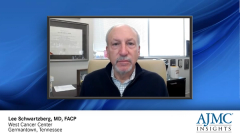
Chemotherapy-Induced Neutropenia: Impact on Cancer Care
An overview of the impact of chemotherapy-induced neutropenia on the selection, dosage, and utilization of chemotherapy.
Episodes in this series

Lee Schwartsberg, MD, FACP: CIN [chemotherapy-induced neutropenia] affects cancer care in several ways. First of all, if a patient develops chemotherapy-induced neutropenia, there may be a delay in recovery of the [neutrophil] counts, and therefore the patient may not start their next scheduled dose on time. If this happens multiple times, the patient will not receive the full dose of therapy on schedule, and we’ve learned over the years that that’s an important component of outcome.
For patients who receive, particularly in a curative setting, chemotherapy that’s less than 85% of the calculated dose when you start, based on the clinical trials that prove the efficacy of that regimen, the outcome for patients who receive less than full dose on schedule can be compromised. What we mean by that is that patients may have increased mortality in a curative setting if they get less than 85% of the planned dose on schedule. If there is a dose delay, if the physician modifies the dose, which frequently happens when a patient develops CIN and then febrile neutropenia, they may get a reduction in their dose in subsequent cycles of therapy.
The combination of dose modifications and dose delays can reduce the total dose of curative therapy given, which can lead to a poorer outcome.
In rare cases, patients may have to discontinue therapy completely if they had a severe complication of CIN. The severe complications of CIN include an unplanned visit to the clinic to get hydration or antibiotics, or even more commonly emergency department visits, admissions to the hospital for febrile neutropenia, which require IV [intravenous] treatment including IV antibiotics, and treatment of those patients who can become very sick.
For the patients in my experience who do have an episode of febrile neutropenia and prolonged hospitalization, they may often not continue their chemotherapy, and therefore, not get the benefit out of that type of treatment.
Newsletter
Stay ahead of policy, cost, and value—subscribe to AJMC for expert insights at the intersection of clinical care and health economics.






